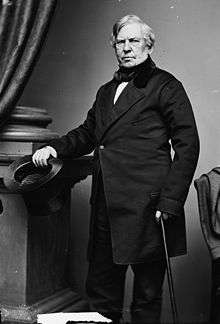William Winston Seaton

William Winston Seaton (January 11, 1785 – June 16, 1866) was an American journalist and the thirteenth Mayor of Washington, D.C.
Life
He was born in King William County, Virginia. From 1812 until 1860 he was, with his brother-in-law Joseph Gales, proprietor of the National Intelligencer at Washington, D.C. From 1812 until 1820 the two were the only reporters of congressional proceedings. Their Annals of Congress, Debates and Proceedings in the Congress of the United States from 3 March 1798, till 27 May 1824 (42 volumes, 1834–1856), and their Register of Debates in Congress from 1824 till 1837 (29 volumes, 1827–37) are sources of the utmost importance on the history of the times.
Mayor of Washington D.C.
Seaton served on the Washington Board of Aldermen from 1819 to 1831, and was elected Mayor of Washington in 1840. However, Seaton was a Whig — the political party formed in opposition to the policies of the Democrats who then controlled both the Congress and the presidency. Federal officials were so distraught at Seaton's election that the Senate introduced legislation that would abolish the city's charter; thanks to petitions from District citizens and sympathetic Senators, the bill was tabled after three readings.
During his 10 years as mayor, Seaton was instrumental in the development of the city's public education system and in numerous civic improvements, including telegraph and gas lines as well as the construction of the first waterworks.
Societies
During the 1820s, Seaton was a member of the prestigious society, Columbian Institute for the Promotion of Arts and Sciences, who counted among their members former presidents Andrew Jackson and John Quincy Adams and many prominent men of the day, including well-known representatives of the military, government service, medical and other professions.[1]
Later life
Seaton died in 1866 of skin cancer and was interred at Holmead's Burying Ground in Washington, D.C.[2] He was later disinterred, and moved to an unmarked grave at Congressional Cemetery.
References
- ↑ Rathbun, Richard. The Columbian institute for the promotion of arts and sciences: A Washington Society of 1816-1838. Bulletin of the United States National Museum, October 18, 1917. Retrieved 2010-06-20.
- ↑ Ridgely 1908, p. 259.
Sources
- William Winston Seaton of the 'National Intelligencer' By Josephine Seaton
- Chest of Books
- Ridgely, Helen West (1908). Historic Graves of Maryland and the District of Columbia, With the Iappearing on the Tombstones in Most of the Counties of the State and in Washington and Georgetown. New York: Grafton Press.
-
 This article incorporates text from a publication now in the public domain: Gilman, D. C.; Thurston, H. T.; Colby, F. M., eds. (1905). "Seaton, William Winston". New International Encyclopedia (1st ed.). New York: Dodd, Mead.
This article incorporates text from a publication now in the public domain: Gilman, D. C.; Thurston, H. T.; Colby, F. M., eds. (1905). "Seaton, William Winston". New International Encyclopedia (1st ed.). New York: Dodd, Mead.
External links
| Political offices | ||
|---|---|---|
| Preceded by Peter Force |
Mayor of Washington, D.C. 1840–1850 |
Succeeded by Walter Lenox |